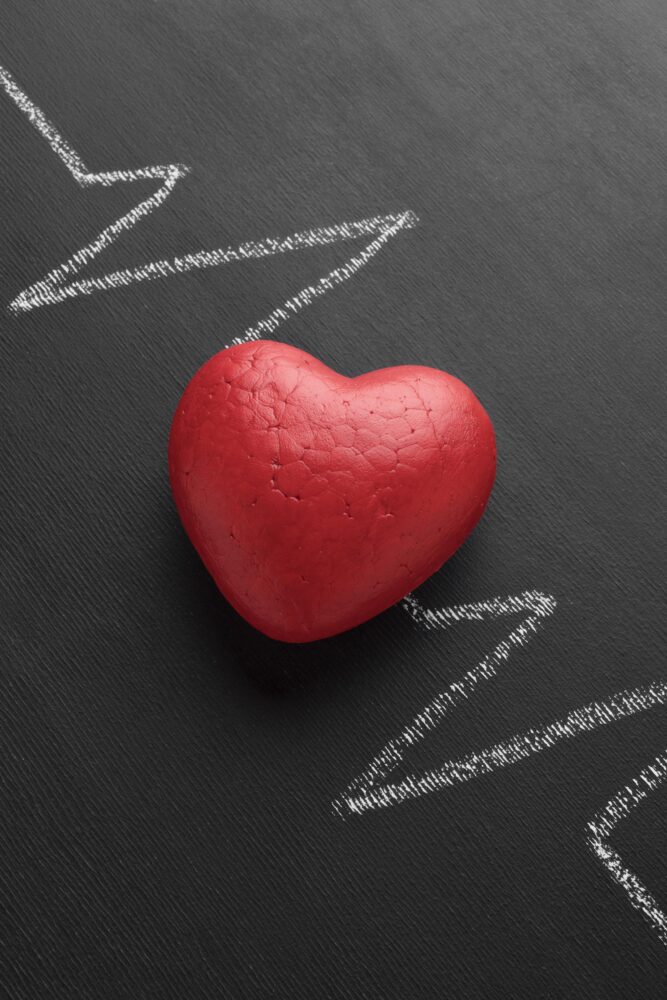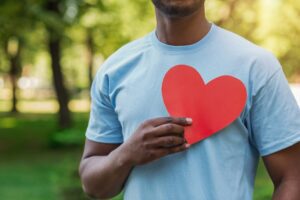
“Nếu trái tim tôi có thể suy nghĩ và đầu óc tôi có thể cảm nhận, tôi sẽ nhìn thế giới theo cách mới và biết được điều gì thực sự là có thật.” Van Morrison.
Trong nhiều thiên niên kỷ, các nhà thơ, tác giả và ca sĩ đã viết và hát về trái tim trong tình yêu, trong chiến trận, trong đau buồn và mất mát. Rõ ràng là tầm quan trọng của trái tim trong văn hóa của chúng ta cũng như tính thiết yếu của nó trong hoạt động của cơ thể, nhưng ngày nay, làm thế nào để giữ cho trái tim khỏe mạnh về mặt thể chất lại khá mơ hồ. Chúng ta tiếp xúc với rất nhiều thông tin trái ngược nhau trên internet, trên TV và từ các chuyên gia y tế. Có phải chỉ là chế độ ăn uống và tập thể dục (nếu vậy, loại nào?), hay yêu bản thân và yêu thương, cởi mở với người khác cũng quan trọng không kém? Chúng ta sẽ khám phá tất cả những điều đó trong bài viết này, đưa ra một vài tình huống bất ngờ và đưa ra một số giải pháp có khả năng hỗ trợ. Có rất nhiều điều cần giải quyết, vì vậy hãy cùng tìm hiểu sâu hơn.
Hệ thống tim mạch của con người
Cơ thể con người và hệ thống tim mạch là những hệ thống phức tạp. Có vô số yếu tố tác động đến sức khỏe của một hệ thống phức tạp, và thật khó để đơn giản hóa chúng thành một vài yếu tố chính. Cũng cần phải nhớ rằng chúng ta không biết nhiều, ngay cả về bản chất vật lý của sức khỏe và bệnh tật. Nhưng chúng ta có thể thảo luận về những gì chúng ta biết, đưa ra một vài giả thuyết và lý thuyết, và khám phá một số khía cạnh phi vật chất hơn liên quan đến tim. Nếu chúng ta vượt ra ngoài một số niềm tin giản lược hơn về cách hệ thống tim mạch hoạt động, chúng ta có thể tìm ra những cách hiệu quả hơn để giữ cho tim và mạch máu của chúng ta khỏe mạnh.
Trái tim có phải là một máy bơm không?
“Có thứ gì đó đang đập bên trong cơ thể tôi, và nó được gọi là trái tim,” Chế độ Depeche.
Một quan niệm phổ biến là tim chỉ là một cái bơm, đẩy máu qua các động mạch và mao mạch vào các mô, rồi trở ra, vào tĩnh mạch, khoảng 60.000 dặm, rồi quay trở lại tim (và sau đó là phổi). Áp lực cần thiết để làm điều đó vượt quá khả năng co bóp của cơ tim. Nếu tim chỉ là một cái bơm, thì nó chỉ có hiệu quả 15-30%. Các cơn co bóp của cơ tim (cơ tim) thực sự bơm máu qua tim và ra ngoài, nhưng máu chảy qua hệ tuần hoàn như thế nào để các tế bào và cơ quan có thể nhận được chất dinh dưỡng và oxy và loại bỏ chất thải và carbon dioxide, và tim đóng vai trò gì trong quá trình vận chuyển máu?
Trái tim có chức năng gì?
“Tôi không thể nói gì hơn, trái tim như tan vỡ hoàn toàn.” Bonnie Tyler là ai?
Rudolph Steiner nói rằng trái tim không phải là một cái bơm; nó là một cơ quan nhận thức. Đó là một quan điểm thú vị, và không phải là không có giá trị. Trái tim là nguồn năng lượng điện từ mạnh nhất trong cơ thể con người, lớn hơn khoảng 60 lần về biên độ so với hoạt động điện do não tạo ra và lớn hơn khoảng 5000 lần về năng lượng điện từ. Trái tim gửi nhiều thông điệp sinh hóa đến não hơn não gửi đến tim. Trường điện từ xung quanh trái tim đã được chứng minh là có thể đạt tới ít nhất ba feet ngoài cơ thể. Thực hành tâm linh đã nói về giao tiếp lấy trái tim làm trung tâm và trực giác trong hàng thiên niên kỷ, nhưng chỉ đến bây giờ chúng ta mới có các công cụ khoa học để bắt đầu nghiên cứu nó.
“Một cái đầu chật chội không còn chỗ cho một trái tim thanh thản,” Christine Evangelou là ai?
Các nhà khoa học thần kinh đã quan sát thấy rằng khi con người tương tác với trái tim, não của họ giải phóng nhiều chất dẫn truyền thần kinh hơn thúc đẩy cảm giác tốt. Chúng ta đã biết rằng suy nghĩ của chúng ta ảnh hưởng đến sinh lý của chúng ta, nhưng liệu chúng ta có thể truyền năng lượng qua trái tim của mình cho người khác không? Các nhà khoa học đang bắt đầu chứng minh rằng chúng ta hoàn toàn có thể làm được điều đó, bằng cách thử nghiệm giao tiếp từ trái tim đến trái tim và đồng bộ hóa các mô hình não theo cặp và sau đó là nhóm người. Suy nghĩ tích cực và yêu thương cùng kết nối tâm trí/trái tim (sự gắn kết) có thể không chỉ hỗ trợ quá trình chữa lành cá nhân mà còn chữa lành ở cấp độ xã hội.
“Lighten up” có nghĩa là nhẹ nhõm và vô tư. “Cold-heart” có nghĩa là bị cắt đứt khỏi kết nối cảm xúc và sự đồng cảm. Khi trái tim và bộ não của chúng ta ở trạng thái gắn kết, trạng thái hòa hợp và thống nhất, chúng ta được hỗ trợ để cảm thấy ít căng thẳng hơn và ít phản ứng hơn, dễ thích nghi hơn, có khả năng não bộ, trực giác và sự minh mẫn về tinh thần cao hơn, và có khả năng phục hồi tốt hơn nhiều.
Chức năng tim vật lý
“(Tốt hơn nhiều so với) Người sở hữu một trái tim tan vỡ; Người sở hữu một trái tim cô đơn,” Đúng.
Nhà triết học người Áo, Rudolf Steiner, cũng mô tả chức năng vật lý của tim như một loại đập, làm gián đoạn dòng chảy của máu, nhưng không ngăn chặn hoàn toàn. Điều này có thể quan trọng khi duy trì áp suất tương đối đều, không chỉ trong hệ thống động mạch áp suất cao so với tĩnh mạch áp suất thấp, mà còn trong thời gian gắng sức khi áp suất động mạch và mao mạch tăng lên. Tương tự như vậy, tim hoạt động như một bộ định tuyến, giúp máu chảy đúng hướng và đến đúng nơi - phổi hoặc tuần hoàn toàn thân. Tim cũng đang tái áp lực máu để đến phổi, do đó, quá trình trao đổi CO2 và oxy hiệu quả hơn nhiều có thể diễn ra. Nếu máu tĩnh mạch áp suất thấp đi thẳng đến phổi, nó sẽ không được oxy hóa đủ nhanh. Bản thân phổi cũng giúp duy trì áp suất trong hệ thống tim mạch, cũng như hệ thống renin-angiotensin-aldosterone. Các van trong tĩnh mạch giúp ngăn máu chảy ngược trở lại, nhưng điều đó không giải thích được tại sao máu có thể chảy ngược lại trọng lực trở về tim.
Các nhà khoa học đã có thể chứng minh rằng máu động vật có thể tiếp tục chảy khi tim ngừng đập bằng cách áp dụng năng lượng bức xạ dưới dạng ánh sáng hồng ngoại vào các mạch máu. Nghiên cứu của Tiến sĩ Gerald Pollack về nước vùng loại trừ (EZ), hoặc 4th nước pha, đã nghiên cứu cách thức nước dạng gel này cho phép chất lỏng chảy qua điện tích, từ đó nảy sinh một lý thuyết thú vị: tim có thể có một cách khác để duy trì lưu lượng máu.
xoáy tim
“Hãy lắng nghe trái tim bạn khi Ngài gọi bạn,” Roxette.
Nhiều thế kỷ trước, Leonardo Da Vinci đã quan sát và phác họa chuyển động xoắn ốc của máu khi nó di chuyển qua tim. Cơ tim co bóp theo chuyển động xoắn ốc, xoáy máu rời khỏi tâm thất phải. Sau đó, máu được oxy hóa bởi phổi và được đưa trở lại phía bên trái của tim để được xoáy lại trước khi đi vào tuần hoàn toàn thân. Điều này cung cấp năng lượng cho nước trong máu, mà nhóm của Tiến sĩ Pollack đã chỉ ra giúp tạo ra nước EZ chống lại lớp lót ưa nước của động mạch chủ và khắp hệ thống tim mạch. Điện tích mà điều này tạo ra có thể giúp đẩy máu đi khắp cơ thể. Nước EZ đã được chứng minh là hoạt động như một rào cản và ngăn chặn mọi thứ ngoại trừ các khoáng chất ion rất nhỏ đi qua, và điều này cũng có thể giúp bảo vệ glycocalyx lót và bảo vệ nội mô (thành mạch máu).
Tiếp xúc hàng ngày với năng lượng hồng ngoại bức xạ từ mặt trời cũng giúp tạo ra nước EZ này trong mạch máu. Điều này có thể giải thích một trong những lý do tại sao phòng xông hơi hồng ngoại đã được chứng minh trong nghiên cứu là hỗ trợ mạnh mẽ lưu lượng máu và tính linh hoạt cũng như sức khỏe của động mạch và tĩnh mạch. Ánh sáng hồng ngoại chiếm khoảng một nửa ánh sáng mặt trời, có trong ánh sáng từ bình minh đến hoàng hôn, có thể xuyên qua quần áo mỏng và có thể phản xạ khỏi cây cối và bãi cỏ và chiếu vào da bạn ngay cả khi bạn ở trong bóng râm. Với vô số lợi ích khác của việc tiếp xúc với ánh nắng mặt trời an toàn, ra ngoài có thể là một trong những việc tốt nhất cho tim mà bạn có thể làm.
Về mặt tâm linh, xoáy nước được coi là nơi chứa đựng mọi mong muốn của bạn, chờ đợi để được thể hiện. Johann Wolfgang von Goethe đã nói, “Những gì xuất phát từ trái tim sẽ chiếm được trái tim của người khác..” Goethe cũng khẳng định rằng, “Một người đàn ông nhìn thấy thế giới những gì anh ta mang trong tim mình.” Vì vậy, cuộc sống của bạn có thể là thiên đường hay địa ngục, tùy thuộc vào những gì bạn cảm thấy trong tim hoặc những gì bạn coi là sự thật—về cơ bản, cách bạn cảm nhận thế giới là những gì được đáp lại cho bạn. Và ngược lại, nhận thức của bạn về những gì "đến với bạn" hoặc không quyết định mức độ căng thẳng của bạn và căng thẳng là nguyên nhân chính gây ra các vấn đề về tim. Ngoài ra, nước EZ hỗ trợ giảm căng thẳng oxy hóa trong cơ thể và ánh sáng mặt trời tạo ra các chất hóa học tạo cảm giác dễ chịu. Cơ thể không phân biệt giữa các dạng căng thẳng khác nhau: căng thẳng là căng thẳng. Có lẽ, ở đó chúng ta có thể bắt đầu thấy sự hội tụ của khoa học và tâm linh…
Những gợi ý hữu ích khác về tim
“Một trái tim tốt, ngày nay, thật khó tìm” Maria McKee
- Giảm hoặc học cách quản lý căng thẳng cảm xúc. Hãy “ở trong trái tim” và cố gắng hết sức để nhận thức và chấp nhận mọi thứ như chúng vốn có thay vì tạo ra những câu chuyện tiêu cực trong đầu. Các kỹ thuật thiền, lời khẳng định, lòng biết ơn, v.v., đều có thể giúp thay đổi các kiểu suy nghĩ tiêu cực.
- Giữ cho quá trình trao đổi chất của bạn khỏe mạnh. Sức khỏe tim mạch và quá trình trao đổi chất linh hoạt có mối liên hệ chặt chẽ. Các nghiên cứu gần đây cho thấy các dấu hiệu chuyển hóa là yếu tố dự báo nguy cơ mắc bệnh tim tốt hơn nhiều so với lipoprotein tỷ trọng thấp (LDL), hiện đang được coi là yếu tố dự báo rất kém, nếu có.
- Đừng sợ muối (biển) và natri. Khoáng chất rất cần thiết cho chức năng tim, chủ yếu là canxi, magiê, natri và kali. Việc bổ sung muối nguyên chất đã được chứng minh là hỗ trợ huyết áp khỏe mạnh.
- Không cần phải sợ chất béo động vật. Giả thuyết về chế độ ăn uống-tim mạch, chỉ trích chất béo bão hòa và cholesterol, chưa bao giờ được chứng minh và trên thực tế, đã bị bác bỏ nhiều lần. Chất béo động vật là nơi duy nhất bạn sẽ tìm thấy axit béo omega-3 và C15 có khả năng sinh học. Xem “Chất béo có loại bão hòa hoặc không bão hòa, bạn có biết sự khác biệt không?” và hãy xem cuốn sách của Nina Teicholz, “Sự ngạc nhiên lớn: tại sao bơ, thịt và phô mai lại có trong một chế độ ăn lành mạnh chế độ ăn uống.” Ngoài ra, một trái tim khỏe mạnh sẽ ưu tiên đốt cháy axit béo (60-90%) và ketone để làm nhiên liệu.
- Uống nước dừa - giàu khoáng chất điện giải và giúp hình thành nước EZ.
- Tránh các loại dầu hạt/rau. Không hề “tốt cho tim”, chúng không ổn định và dễ bị oxy hóa, gây ra các vấn đề trong hệ thống tim mạch. Bằng chứng cho thấy không có lợi ích gì khi thay thế chất béo bão hòa bằng chất béo không bão hòa đa. Axit béo không bão hòa đa và dầu giàu axit linoleic đã tăng đều đặn trong chế độ ăn uống của chúng ta trong 100 năm qua và bệnh tim cũng tăng theo.
- Đi bộ, nâng tạ, duỗi người, chạy nước rút. Trái tim bạn sẽ yêu bạn vì điều đó. À, và đừng hút thuốc nhé!
- Giữ cho hệ vi sinh vật đường ruột của bạn khỏe mạnh, bắt đầu từ miệng. Sức khỏe tim mạch và sự cân bằng vi khuẩn đường ruột có mối liên hệ chặt chẽ với nhau.
- Đưa thiền trái tim vào thói quen chăm sóc bản thân. Phát triển một cái bụng nóng (lửa bụng = cảm hứng, đam mê và động lực), một trái tim ấm áp (giao tiếp và kết nối lấy trái tim làm trung tâm) và một cái đầu lạnh (suy nghĩ và giải quyết vấn đề của người lớn một cách khách quan và nhanh như tia laser).

Thảo mộc và thực phẩm bổ sung
“Làm trái tim tôi đau đớn,” Các loại thảo mộc
CoQ10—Nghiên cứu cho thấy Coenzyme Q10 hỗ trợ sức khỏe tim mạch và sản xuất năng lượng. Được coi là thiết yếu để hỗ trợ chức năng tim mạch và não. CoQ10 có trong nhiều loại thực phẩm, với nguồn giàu nhất là nội tạng động vật, chẳng hạn như thận và tim.
Collagen—hỗ trợ thành mạch máu khỏe mạnh. Xem “10 lý do bạn nên uống Bone Nước dùng.” Thực phẩm bổ sung collagen thủy phân là một lựa chọn thay thế cho nước dùng collagen tự làm.
Axit amin: Taurine—Nghiên cứu đã chỉ ra rằng axit amin taurine có tác dụng hỗ trợ khi chức năng tim mạch bị suy yếu. Creatine—Việc bổ sung loại axit amin này đã được chứng minh là có tác dụng hỗ trợ co bóp tim và chuyển hóa năng lượng khỏe mạnh. Carnitin đã được chứng minh là có tác dụng hỗ trợ chức năng tim và làm giảm các biểu hiện trong quá trình suy tim. Carnosine, anserine và hydroxyproline—các axit amin khác cần thiết để hỗ trợ sức khỏe tim mạch. Không có loại nào trong số này được tìm thấy với số lượng đáng kể trong thực phẩm thực vật, chỉ có trong thực phẩm động vật.
Vitamin K2—có trong lòng đỏ trứng, bơ, mỡ động vật và một số thực phẩm lên men. Hỗ trợ sự linh hoạt của cơ tim và động mạch và điều hòa canxi. Thường kết hợp với vitamin D3. Hỗ trợ sức khỏe tim mạch và xương.
Tỏi-một phương thuốc cổ truyền giúp duy trì huyết áp khỏe mạnh.
Nghệ, xô thơm, bạch quả, lá ô liu, gừng, đan sâm, tulsi, Và quả táo gai là chỉ một số loại thảo mộc có thể hỗ trợ tim khỏe mạnh và chức năng tim mạch. Tulsi (húng quế) và nghệ cũng có thể giúp tạo ra nước EZ.
Nếu bạn lo lắng về sức khỏe tim mạch của mình, hãy đến gặp bác sĩ gia đình hoặc trao đổi với chuyên gia sức khỏe để được tư vấn chế độ ăn uống, lối sống và thực phẩm bổ sung từ thảo dược phù hợp với bạn.
Số phê duyệt của TAPS: PP3036


